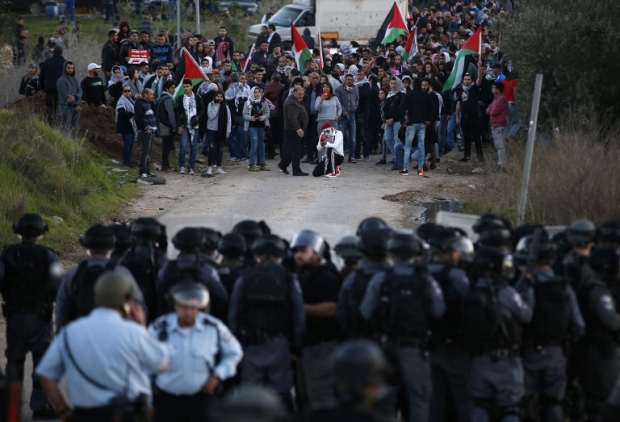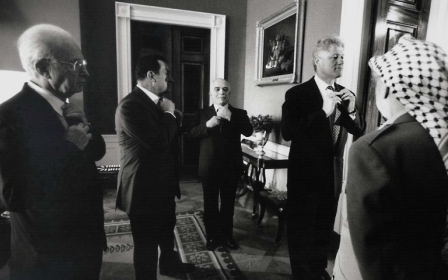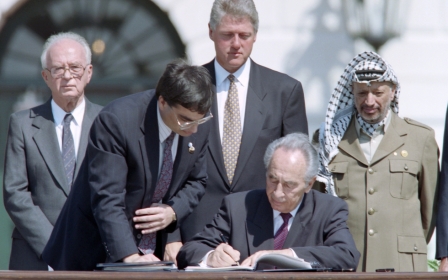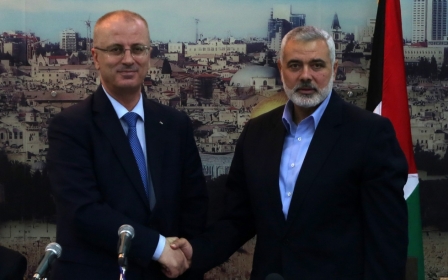Out of the ruins of Oslo, a democratic state of all its citizens can be born
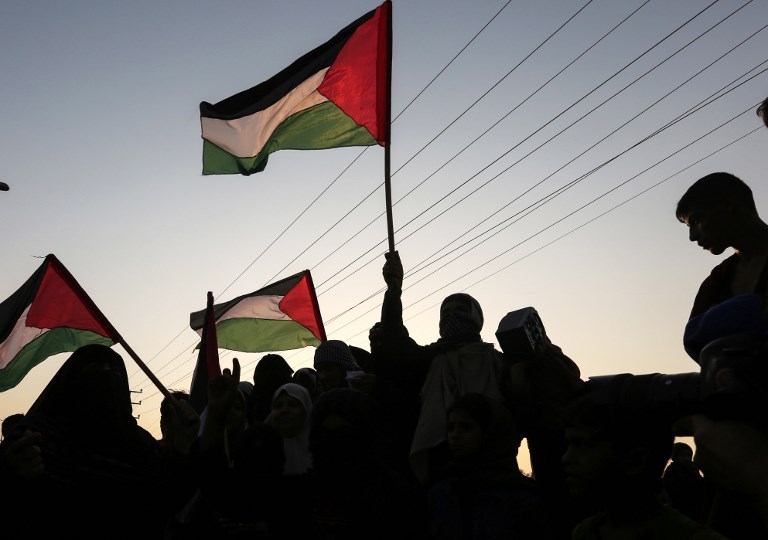
In September 1993, upon my return from a UN-sponsored conference in Vienna on the Palestinian question, I read in a newspaper about the Oslo agreement. I was shocked.
I had attended the conference in my capacity as deputy secretary general of Abnaa al-Balad (“Children of the Country”), a political movement advocating for a single secular state in all of Palestine. Its revolutionary fervour, and the courage it showed in the face of Israeli policies by identifying openly with the Palestine Liberation Organisation (PLO), attracted hundreds of Palestinian students in Israeli universities.
Unlike most political parties, Abnaa al-Balad reacted strongly against Oslo, dismissing it as a betrayal of the Palestinian struggle. Critical intellectuals, such as Azmi Bishara, reacted in a similar fashion. These critiques noted that the deal was reached and signed in an undemocratic way, behind the backs of the collective leadership, the PLO and the Palestinian people.
Legitimising Zionism
Critics also pointed out that, according to the agreement, the PLO recognised the state of Israel, while Israel recognised the PLO but not the Palestinian people’s right to an independent state. The agreement refrained from calling for an independent Palestinian state, recognising the right of return and ending Israel’s settlement policy, which brought about a Bantustan-type apartheid regime.
In addition, by endorsing the two-state solution, and with total ignorance of the rights and futures of Palestinians within Israel, Oslo perpetuated their plight and inferior status in the self-declared Jewish state. The deal relegated the plight of this community, comprising more than a million people, to an internal Israeli affair. Oslo also legitimised Zionism.
Aware of the impossibility of realising full equality in Israel as long as Israel is a 'Jewish state', those of us who founded Balad aimed to constructively transform the contradictions inherent in Zionism
Ironically, Palestinians with Israeli citizenship - once viewed by other Palestinians as collaborators - were the first to respond to Oslo by establishing a new party that resumed the ideological and political struggle against Zionism. Balad, which started out as a coalition of different parties and academics, endorsed a political programme advocating for Israel to become a state of all its citizens, thus challenging its racist character.
Aware of the impossibility of realising full equality in Israel as long as Israel is a “Jewish state”, those of us who founded Balad aimed to constructively transform the contradictions inherent in Zionism. We did this by campaigning among Palestinian citizens in Israel, explaining that voting for leftist or centrist Zionist parties and giving up their national identity would bring them neither civil rights nor national collective rights, in terms of access to land, national heritage and independent education.
This new political discourse became predominant among Palestinian parties, curbing the cultural and political distortion that Oslo had set in motion. Making the shift from the “liberation of Palestine” to the notion of changing Israel into a democratic state took years of meetings, discussions and seminars.
Demands for full equality
Given the Palestinian, Arab and international consensus over the demand for an independent Palestinian state in the West Bank and Gaza, we could not ignore this in our new political programme. But to keep alive our vision of one state in historic Palestine, we also included in the programme demands for full equality and citizenship.
We pointed out that full equality could only be achieved through the abolition of the “Jewishness” of the state, including the right of Palestinian refugees to return.
The relentless incitement campaign launched by the Israeli government, Zionist political parties and pundits - along with repeated attempts to disqualify Balad and its former leader, Azmi Bishara, from running in Knesset elections - only consolidated the party’s relationship with its constituency and beyond.
This aggressive campaign was driven by the claim that the party was denying Jews the right to have their own ethnic state. Combined with the party’s efforts in organising and educating, this helped to entrench Balad’s truly democratic approach to equality, full citizenship and collective rights among its constituency.
Meanwhile, Israel’s growing antagonism, manifested in discriminatory legislation, land confiscation, home demolitions and other forms of repression, has been directed against the Palestinian minority in Israel and certain political movements. In 2016, the Islamic movement was declared illegal and faced a crackdown; around the same time, Israeli authorities carried out mass arrests against Balad leaders and activists, myself included. I was detained for 11 days.
Such repressive policies have weakened Arab parties and their ability to mobilise their constituencies against Israeli oppression. Palestinians in Israel feel that they are no longer distinguished from their brethren in the 1967-occupied territories, as they are increasingly subjected to Israel’s colonial oppression. This reality is producing a sense of urgency among Palestinians everywhere to coordinate joint activities against the Zionist regime.
New paradigm
Over the last 15 years, and in particular since the Second Intifada, a new paradigm has been in the making. As the Palestinian Authority continued negotiations with Israel, while the latter persisted in killing the two-state solution, alternative grassroots initiatives began to emerge, aiming to rebuild the Palestinian narrative.
Those behind such initiatives - which are being worked on by popular committees, activists, former political leaders, and critical academics and intellectuals, without a common political umbrella - believe that we should create the antithesis of Oslo, and that Palestinians should focus on 1948, on the roots of the conflict.
They argue that Oslo has fragmented the Palestinian people, politically and geographically, created a false consciousness, and distorted the essence of the conflict by reducing it to a territorial one, rather than a colonial one.
Integral to the ongoing debate is the demand to reframe the struggle as one between a colonised people and an apartheid coloniser, rather than one between two equal national movements, or two states, one of which does not physically exist.
Recent antagonistic moves by US President Donald Trump and the Israeli government - to wit, moving the US embassy to Jerusalem and legislating Israel’s nation-state law - have dealt a knockout blow to the illusion of the two-state option, as well as to the possibility of realising equality for those Palestinians with Israeli citizenship who survived the 1948 Nakba and managed to stay in their homeland.
One democratic state
These bleak developments provide an opportunity for critics of the Oslo paradigm, and for all Palestinians, to work out an alternative vision based on reconstructing the Palestinian narrative to emphasise that Palestinians are one people, wherever they reside, historically, culturally and politically; reframing the struggle as an anti-colonial one; and endorsing the one-democratic-state solution in all of historic Palestine.
Under this model, all Palestinians, including refugees, as well as Israeli Jews, could live under an egalitarian regime built on the ruins of the existing colonial apartheid one.
Within Balad, a serious discussion has been ongoing for several years. The option of boycotting the Knesset elections is part of this debate, particularly after the passage of the nation-state law
The debate over shifting the two-state paradigm to the one-state model, and creating in the country a state of all its citizens, will surely gain further momentum in the coming years. Within Balad, a serious discussion has been ongoing for several years. The option of boycotting the Knesset elections is part of this debate, particularly after the passage of the nation-state law.
Some Israeli anti-Zionist academics and Palestinian intellectuals from the 1967-occupied territories foresee a special role that could be played by Palestinian citizens of Israel in rebuilding the Palestinian project, with a new vision inspired by South Africa’s egalitarian model.
While the current situation in Palestine, 25 years since Oslo, is bleaker than ever before, the Palestinian people will not surrender. They can count on the justness of their cause, their presence on their land, and Israel increasingly revealing itself as an aggressive, colonial, immoral regime.
There is still a long road to walk, but this is the only way to achieve liberation, justice and lasting peace in the holy land.
- Awad Abdelfattah is a political writer and the former general secretary of the Balad party. He is the coordinator of the Haifa-based One Democratic State Campaign, established in late 2017.
The views expressed in this article belong to the author and do not necessarily reflect the editorial policy of Middle East Eye.
Photo: Palestinian protesters wave their national flags during a demonstration in Gaza on 4 September (AFP)
Middle East Eye propose une couverture et une analyse indépendantes et incomparables du Moyen-Orient, de l’Afrique du Nord et d’autres régions du monde. Pour en savoir plus sur la reprise de ce contenu et les frais qui s’appliquent, veuillez remplir ce formulaire [en anglais]. Pour en savoir plus sur MEE, cliquez ici [en anglais].



